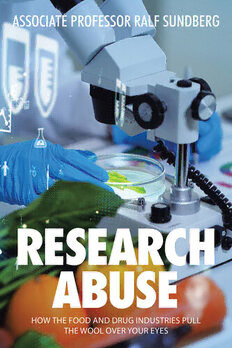
Research Abuse: How the Food and Drug Industries Pull the Wool Over Your Eyes PDF
02020·2.31 MB·English
Most books are stored in the elastic cloud where traffic is expensive. For this reason, we have a limit on daily download.
Preview Research Abuse: How the Food and Drug Industries Pull the Wool Over Your Eyes
Description:
In his book Research abuse – how the food and drug industries pull the wool over your eyes, Ralf Sundberg discusses questions regarding research in Nutrition, from a biological, social and economic perspective. Today, we understand that nutrition is not firstly to provide fuel, but more importantly to provide building blocks for the renewal of our cells and tissues. But nutritional science has from the fifties and on, been surrounded by myths and misinterpretations of the prevalent data. Policies and recommendations were formed in the absence of evidence, often by experts tied to commercial and political interests. In this book Dr Sundberg uses the examples of fat and cholesterol, not only to illustrate historical mistakes in this area, but also to demonstrate how we humans are subject to so many biases in so many areas. In fact researchers as all humans are formed by emotions, group thinking, hope of success, fears of many kinds, which many times leads to misconceptions, when put on print and regarded as facts, and live on for decades. Ralf Sundberg, a former general and transplant surgeon conducted a remarkable career, with transplant pioneers Folkert O. Belzer at UW-Madison in the mid-eighties, and with Thomas E. Starz at the University of Pittsburgh in the early nineties. Having retired from clinical work, apart from book writing, he is still active in research on diabetes, fats and cholesterol. He is the author of more than forty scientific papers, many published in high-ranked journals, and has authored a number of books, published in Sweden and Norway. This is his first book, to be published in English.
See more
The list of books you might like
Most books are stored in the elastic cloud where traffic is expensive. For this reason, we have a limit on daily download.
